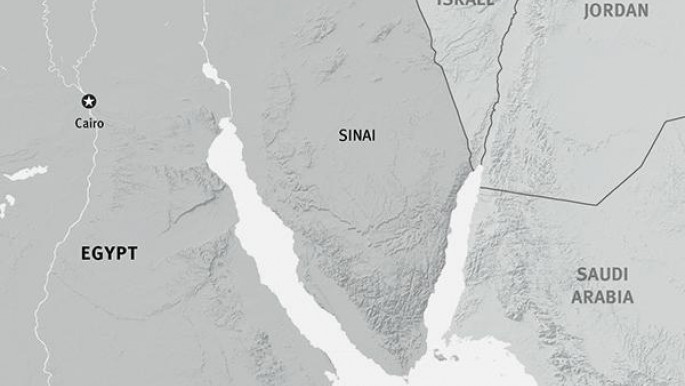Egypt's mass home demolitions in Sinai 'breach international law'
The Egyptian military's campaign against Islamic insurgents in northern Sinai is harming thousands of civilians and risks turning more people against the government, Human Rights Watch said in a report Tuesday.
The government has evicted 3,200 families over the past two years, and razed hundreds of hectares [acres] of farmland and thousands of homes in its bid to destroy smuggling tunnels connecting the Gaza Strip with Egypt's northern Sinai Peninsula, the rights group said.
| Every picture frame, every stone, every piece has a history and stories. How we lived sweetly and how we struggled and built our life from nothing |
Hajja Zaynab, a woman in her sixties and the mother of several sons and daughters, lived in Salah el-Din neighbourhood.
She told Human Rights Watch that an army patrol came in late October to warn her family to leave.
"My heart breaks at every detail in the house. Every picture frame, every stone, every piece has a history and stories. How we lived sweetly and how we struggled and built our life from nothing without even a pound from those who are coming to destroy our life," she said, describing the pain of losing her house.
"My mother told me ‘[Our olive] tree is your responsibility. I fed you from it and raised you on it. Even in times of war, we lived from its oil when nobody could find food.’ Now there’s nothing I can do but hold the tree and kiss it and say, ‘Forgive me, mom, what can I do.'"
 |
|
Buffer zone
Egypt's government wants to create a buffer zone along its border with the Gaza Strip to destroy a cross-border network of tunnels.
The government accuses Islamic militants of using smuggling tunnels to move between Sinai and Gaza, which is ruled by the Palestinian group Hamas.
The remote territory is characterised by hardscrabble towns, desert and mountainous areas suitable for guerrilla operations.
Some disaffected local Bedouin tribesmen in the region, which suffers from economic hardship, have turned to smuggling, organised crime and, in some cases, radical Islam.
The Egyptian government has been battling a long-running insurgency in the region, which escalated after the military ousted Islamist President Mohammed Morsi in July 2013 amid massive protests against his rule and cracked down on Islamic groups.
A local Islamic State affiliate has been claiming responsibility for militant attacks in northern Sinai.
While violence has largely been confined to the region, bombs have also hit other parts of the country, including Cairo.
Human Rights Watch said the United States had trained the Egyptian military to use "sophisticated tunnel-detecting technology" to find and destroy tunnels and avoid wiping out entire neighbourhoods.
The organisation also said it received video footage showing American-made M60 tank shelling a building to demolish it.
"Destroying homes, neighbourhoods and livelihoods is a textbook example of how to lose a counterinsurgency campaign," said Sarah Leah Whitson, the organsation's director for the Middle East and North Africa.
"The Egyptian authorities provided residents with little or no warning of the evictions, no temporary housing, mostly inadequate compensation for their destroyed homes — none at all for their farmland," the organisation said in a statement.
| We were watching from our relatives’ house next door when they blew [our house] up. The moment of the explosion, I felt my heart tear. I still dream of that sight |
Another resident, Feda recounted how her family watched their house being blow up.
"We were watching from our relatives’ house next door when they blew it up. The moment of the explosion, I felt my heart tear. I still dream of that sight," she said.
"It was the first time in my life that I saw my husband crying. The children burst into tears when they saw their father and asked him 'Why is the army demolishing our home and making you cry, dad?' He didn’t know how to respond to them, but after some time when they’ve been playing in the street with other children, they’ve learned from each other to call the army traitors and al-Sisi a traitor."
In a statement that coincided with the HRW report, President Abdel-Fattah el-Sissi's government denied that it was violating human rights of residents of the northern part of the Sinai Peninsula and was taking measures to protect civilian lives and property.
Civilians harmed in campaign
HRW called on the United States to access the area and make sure its weapons aren't being used in violation of human rights.
As Egypt fights insurgents in northern Sinai, "it should do so in a way that does not arbitrarily harm civilians and violate their right to housing and their protections during forced evictions," the organisation said.
Northern Sinai has been largely closed off to media, and it is difficult to independently verify reports from the area.
The Egyptian government's statement said authorities have "adopted a comprehensive plan" to fight militants in northern Sinai while complying with recognised international human rights laws and protecting the lives and property of civilians.
The statement made no mention of the HRW report but was a clear reaction to the allegations in it.
The government plans in the restive north of the peninsula "guarantee the protection of the lives and property of citizens," the Cabinet said, adding that it is compensating for property losses due to the operations but offered little specifics.
"Residents are constantly informed to stay at home when security operations are underway," the statement added, stressing the government is keen to provide all services and basic goods to the people in northern Sinai.
It also said that said some buildings were evacuated mainly "to ensure the safety of their residents and to prevent terrorists from using them as human shields."




 Follow the Middle East's top stories in English at The New Arab on Google News
Follow the Middle East's top stories in English at The New Arab on Google News


